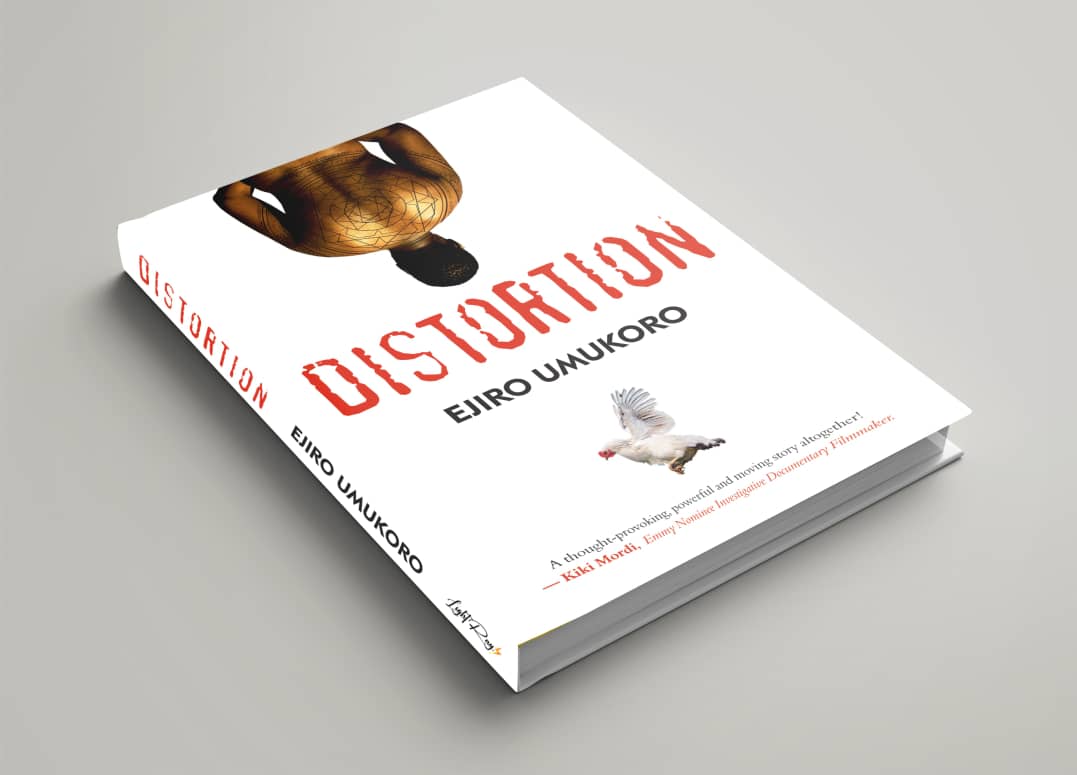Excerpt from DISTORTION, mental health crime fiction novel by Ejiro Umukoro is a multi-award-winning Broadcaster, Investigative Journalist and Social Entrepreneur

Umu-Oti was in an uproar. There was pandemonium. Tears flowed from many faces. Children wailed and adults screamed expletives. They had never seen anything like that before in their town. All roads led to the Skills Acquisition Centre and Church. It was a long march, but nobody cared.
The vigilantes led the group, bearing tyres, swinging machetes in the air, and chanting, ‘Justice!’ By the time they got to the Skills Centre, Mama G and her cronies were long gone. An enraged crowd wreaked their vengeance on everything in sight: signboards, furniture and equipment, doors and windows. They held all the staff hostage and were about to lynch them when gunshots rang out from a distance. The mob scattered tentatively.
From a safe distance, Akpobrume took pictures and began to film the scene. He had never been so close to a community vendetta. He made his way through the mob and sneaked upstairs discreetly, filming and snapping pictures, opening doors and checking out the rooms as he went. Enterprising looters had beaten him to one of the rooms, a bedroom by the look of it… or perhaps the owner had left in a hurry: drawers and wardrobes lay open, with clothes and possessions strewn all over.
He looked around quickly and was about to pull the door shut when he saw it on the ground: a photocopy of a cheque. He picked it up. It was made out to one Gina Nwankwo. He folded it into his pocket and walked out. Then he walked to the opposite end where he found another door. He turned the door handle and turned the key in the lock. The door fell open. What he saw after his eyes adjusted to the poor light shocked him to his roots: over a dozen emaciated girls huddled together in the far end of the darkened room.
“What are you doing here?” he asked, but the girls just stared at him silently, tearfully. He took a step into the room and asked, more gently. “What is going on here?” A pregnant girl spoke, “We are waiting for Mama G. She says today is immunization day.” Akpobrume stared at them for a beat, stunned into silence, as he realized the true nature of the business of the ‘Skills Centre’. The knowledge was like a blow to his guts.
“Don’t be afraid,” Akpobrume said gently. “You will not see Mama G again. She has run away. The police are after her now.” The girls exchanged surprised looks, unable to comprehend the meaning of what Akpobrume just said. As Akpobrume filled them in on the discovery of Mena’s body and the sacking of the centre, some girls wailed in relief. Others collapsed on the floor, overcome by emotion. It was a difficult sight for Akpobrume to absorb.
When some calm settled in, he cautiously cued his camera, rolling his midget as a backup. He knew there was a chance they would clam up, and his recent disgrace for not getting verifiable data was too fresh in his mind. The girls were reluctant at first, ashamed of how they had been abused. But the motivation to expose Dr Inseminator and Mama G, inspired them to tell all.
They even described how they watched Chu-Boy bury two other girls in a pit behind their building. One of the girls got up and pointed through the window: “Na for that place,” she said. Akpobrume peered through the smeared window, just making out the outline of the pit.
READ ALSO: MY VISION FOR MEGA 89.1 FM – EJIRO UMUKORO
Akpobrume tried to contain his excitement as the facts and descriptions came. This was the sort of news he liked to break. It had all the makings of a viral story. Then it struck him that Dr Inseminator and Abu the Chemist were one and the same person. He had hit jackpot. By the time Akpobrume got to the bottom of the stairs, he saw the police rounding up a line of teenage girls and women emerging from a room some distance from where he was.
The girls looked emaciated while the three women among them were dressed in dark-green uniforms. He walked out quickly. He didn’t want to have to answer questions to the police when they found the girls upstairs. Outside, he found more policemen by their troop carriers, radioing their colleagues at neighbouring roadblocks with the descriptions of the getaway vehicles, a maroon Mercedes Benz E class and a navy blue Peugeot 505.
*** “You should be proud of yourself, Akpos,” boomed the editor, gaily, “this is the sort of journalism we need!” “Thank you, Sir!” Akpos replied, trying hard not to sound smug.
That evening The Advancement Newspaper rolled out its evening edition with the bold headline: SKILLS ACQUISITION CENTRE: A COVEN FOR HUMAN TRAFFICKING, PROSTITUTION AND BABY SELLING
By the time other media houses got a hint of the story, his newspaper house already had the lead. His story in the paper brought correspondents from other media houses to Umu-Oti, thirty-six hours after the news broke. All they had were leftovers. But he didn’t mind being interviewed by other media organisations.
Although he didn’t particularly like the attention – his colleagues have dubbed him ‘popular jingo’ – he did like that his work had gained some traction and recognition.
*** Two weeks after the Skills Centre scandal broke, Akpobrume was still churning out investigative updates to the initial story, seven lead reports in all.
He interviewed psychiatrists and psychologists for insights into the behavior of Abu and the syndicates. He got lawyers’ perspectives on their potential sentences. He also spoke to social workers, members of the community, religious bodies, influential personalities, politicians, and police investigators.
Then he produced a TV documentary on the scandal and sold its rights to Joe, his old friend from Federal Radio Training School days, to air on their media channel, TV International. Looking out the window, he saw large crowds of people still milling around. The indigenes and residents of Umu-Oti were restless.
The town was now a beehive, it had taken on a new personality. From the edge of the chair, Akpobrume’s legs danced as he typed. It was a long time since a story had possessed him so.
Every day, he uncovered a new, even more gruesome, twist to the facts. His name was now a hit in media circles. The clickety-click of the keyboard droned on as Akpobrume typed away furiously. He was writing a special feature, a new slant to the story that had just occurred to him.
Hours later, Akpobrume sent in the feature. He got up and stretched his legs, every joint protesting two weeks of over-exertion. His eyes ached too. He hadn’t had much sleep, yet he felt more alive than he’d ever been. This was what he enjoyed doing. This was what gave him purpose. This was his personal self-actualisation – the definition of his own esteem.
He didn’t fancy the idea of applying for prizes and awards – not that he didn’t like the prospect of winning – but he had a more satisfying sense of self-fulfilment for accomplishing this feat alone and on his own terms. His colleagues at Head Office were jealous of his success. Only Tonye who handled entertainment news and Haruna in sports congratulated him on his story. Suddenly everyone wanted to be transferred to Umu Oti.
Abu stepped onto the street. He wanted a hot soaking bath and massage. He laughed at himself. Who was he kidding?
*** Three months later, just as he was about to close for the day at the office, Akpobrume got a letter with an unmistakable embossed logo. He opened it excitedly and began to read. He had just been nominated as one of the finalists for the Television Features Award of the African Journalist Awards. The letter congratulated him for his extraordinary coverage in breaking the Skills Centre story.
But the nomination hadn’t even been for his newspaper piece. His friend, Joe, had entered the documentary. He chuckled. Persistent Joe. That evening he took Kojo out to celebrate his nomination over suya and drinks. Kojo harassed him with questions on the case and the chances of apprehending the culprits. As they left the suya spot, Kojo asked, “Uncle Akpos, why do people who do bad things to other people get away with wickedness?”
Akpobrume starred at the young man as his own internal struggles simmered to the surface. Without the rule of law, there were many holes that make it easy for bad people to escape justice. Words failed him. He turned away, embarrassed by his inability to offer the young man any hope.
Eventually, he sighed, “When good people refuse to keep silent, then evil will never survive. Do you understand, Kojo?” “Yes, Uncle.” Akpobrume took Kojo’s hand. His mind was made up, and as they walked home together hand-in-hand, his resolution grew. Inside his room, he made a silent promise. For Kojo, for Mena, he would get Abu, no matter the cost.
No justice, no healing.
This is the link to order direct
Promo Code for anyone who buys directly from www.mediacareerng.org is: 001/DLM/MCDN
BLURB on DISTORTION
From century-dead ancestors, a family curse reaches out to haunt Abu, claiming first his mother, and turning his community against him. Even his status as a pharmacist in the small town of Umu-Oti does not give him what he craved most: the respect of society and the affection of women.
He battles his demons of mental health and sexual addiction while negotiating hurdles of caste discrimination and ruthless cults, but it is his alliance with the malignant widow, Mama G, that takes him to the precipice, and puts him on the radar of investigative journalist, Akpobrume.
About the Author:
Ejiro Umukoro is a multi-award-winning Broadcaster, Investigative Journalist and Social Entrepreneur. A pioneer General Manager of MEGA 89.1FM, Warri, she has been interviewed across various media (including the BBC, Pulitzer Centre, Channels TV, TVC, and Voice of Nigeria) for her impactful work in civic intelligence and children and women’s rights advocacy.
An Award Fellow of the Wole Soyinka Centre for Investigative Journalism (Report Women Network (REWON), she is a WanaData Champion, a Pulitzer Centre Grantee, and winner of the British Council International Communications Entrepreneur (IYXE) Award. Ejiro is also an ICFJ Knights Nominee and Mentor of the ICIR-MacArthur Foundation Capacity Building Initiative for Journalists. And she currently mentors over 150 students across over 10 universities in Nigeria with members from East Africa.
Her debut novel, Distortion, is a mental health fiction based on real-life incidents encountered in her investigative series into Domestic Violence and Broken Boys and Broken Girls Trapped Under COVID-19, as well as in the course of her career as a media practitioner.
Ejiro Umukoro’s mission is to inspire greatness in people and to create sustainable creative economies in a digitally converging global community.




FELIX AMRAIBURE
You’re a genius 😂 ma! Keep doing the good work, really appreciate your efforts, and please don’t forget to give out our leaders contact as well. Really enjoy today’s program and I will appreciate if you can extend it to the state governor and their deputies ma. God bless you.